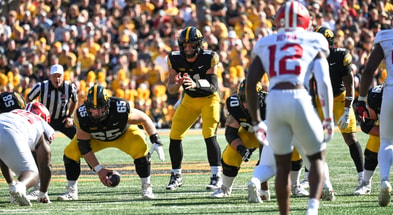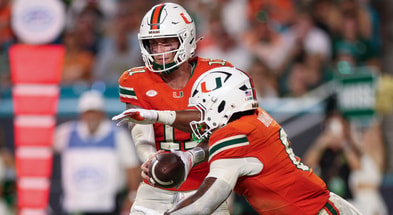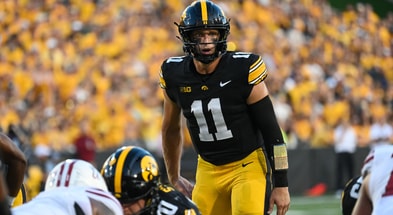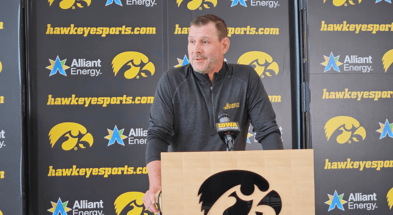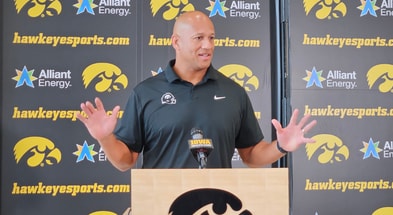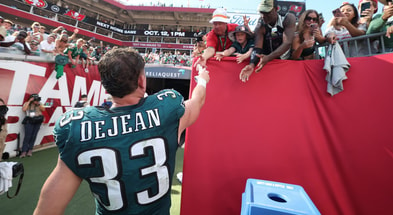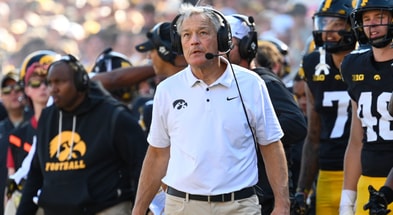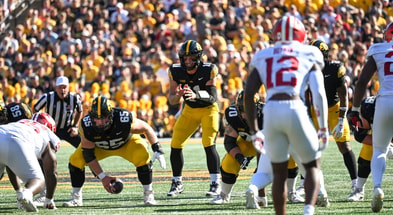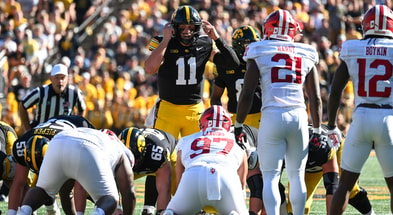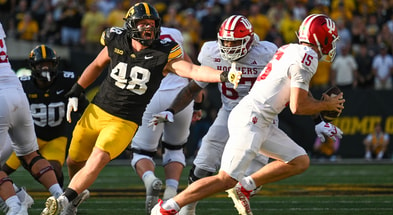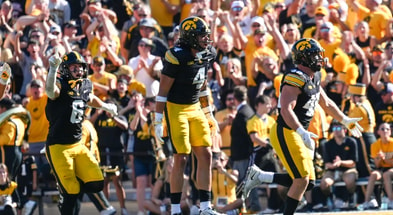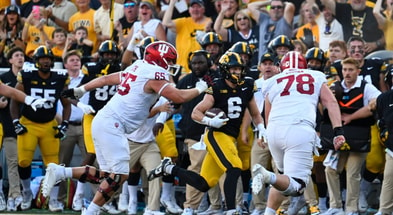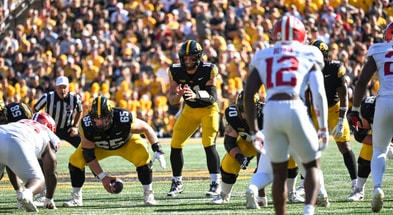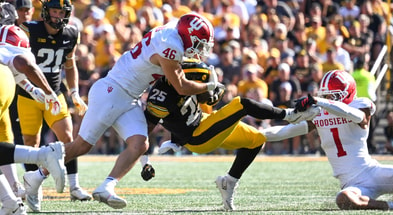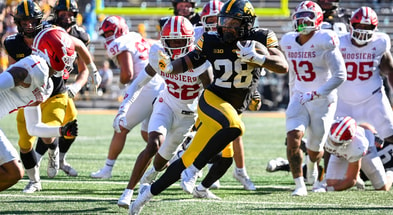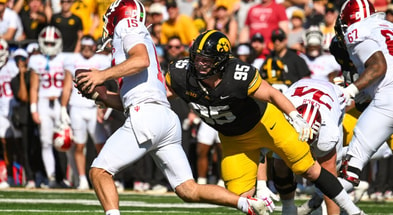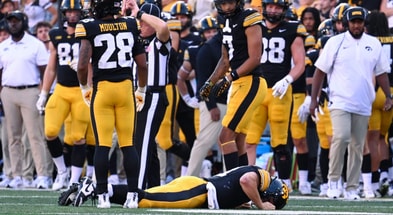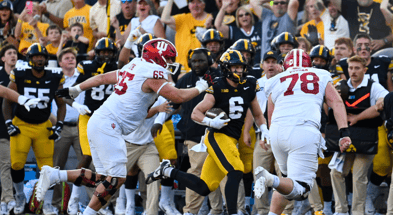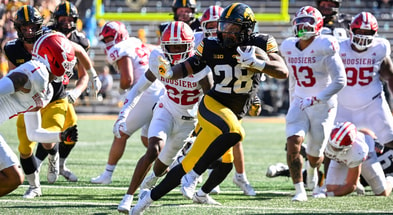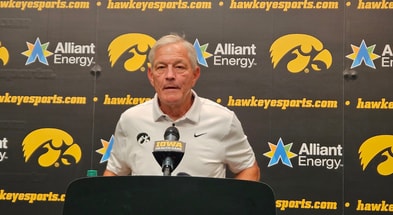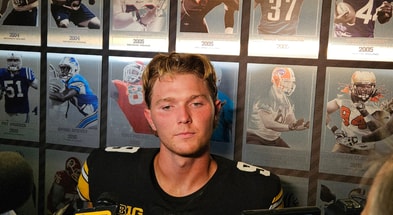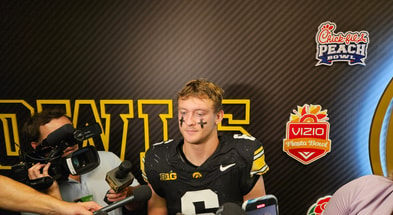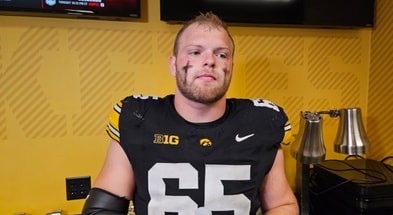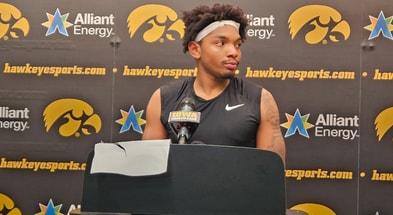Phil Parker weighs in on the Iowa defense
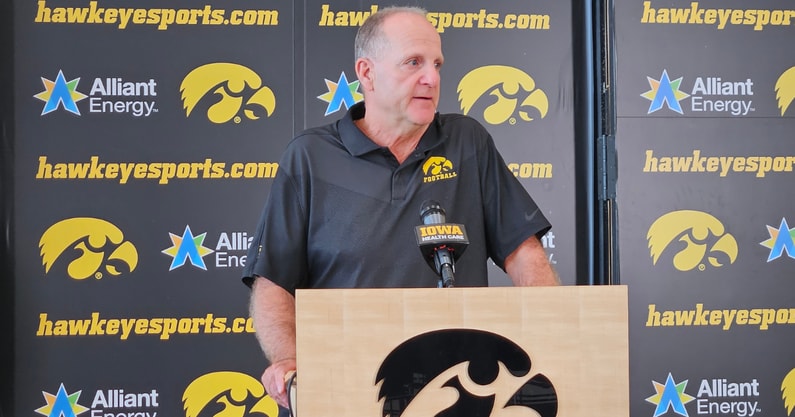
While Phil Parker is feeling pretty good about the Iowa defense five games into the 2025 season, he also sees plenty of areas where there could be improvement. He talks about his defense giving up too many explosive plays, the challenge of practicing tackling during the season, and why he is blitzing more in early downs this season.
PHIL PARKER OPENING STATEMENT: Welcome, everybody. I wanted to say a couple of things about our team, where we’re at. Our record is 3-2, but you can’t really tell that by the way our kids have been putting the effort in, the time and the practice.
I’ve been really pleased for the last five weeks the way they’ve been practicing and the way they go about their business. You can go all the way back to camp and the four weeks that we were in the camp. I’m pleased where we’re at.
We have a lot of young guys that are growing in their positions, and they’re learning on the run. I think this is a good break over here to re-evaluate some of our players and some of our schemes and then move on to the next one against Wisconsin.
Q. You’ve been blitzing it seems like more, especially the last couple of weeks in big games. Why is that, and what’s that done for you?
PHIL PARKER: You look at different situations. It’s depending on who you’re sending on a blitzer. That’s one. Norm Parker also used to say, It’s not about the blitz, it’s about the guys that you are sending.
We have probably brought more blitzes on different situations on second down, maybe, that I haven’t really done in the past, but I think it’s helped us a little bit and keep the quarterbacks a little bit off balance and uncomfortable, but when you blitz, you have to make sure that you cover guys. Sometimes it can get you. If you blitz, sometimes it can hit you one play like it did last week, but you have to live with that. You have to live with it and say, hey, the success that you had, we blitz on a couple of fourth downs and one, and we won a couple of those. I think it was three of them.
So, there’s a trade-off, you know what I mean? The same thing with coverages in the back end. If you want to play press coverage or if you want to play two high in a shell, what do you want to do? Do you want to let them move the ball down slowly or four, five plays and then all of a sudden they hit a big play, and then hopefully you can hold them to a field goal.
So the philosophy hasn’t changed about the explosive plays. We’ve probably given up too many explosive plays so far (25 yards or more). So we’re still working on that and trying to make sure that everything is important, every play is important, and kids got to understand that.
Q. I wanted to piggyback off of that. The call on the third and 10 from the Iowa 49 and decided to bring a pressure. I know that generated Zach’s pick earlier in the game, but can you just kind of walk through the decision-making process and bringing pressure in that situation?
PHIL PARKER: It’s usually a feel in the game of how we’re going about things. I did bring the pressure on the other one. Got the interception on it.
It was a time where, hey, it’s either they were getting a little bit close to kick a field goal, the time is starting to run a little bit down. I thought we had to hurry up and make a decision on, hey, put a little bit of pressure on the quarterback, see if he can get it out. Are they going to punt it after that?
It was just a little bit. That’s the way those things are. I wouldn’t say all or nothing, but you have to make sure you’re perfect. You can always go back and second guess yourself like that.
I just remember one time and said, hey, we can go the other way and play two-man and play two over the top, and I did that probably, two years ago and did that, and all of a sudden it went for a straight touchdown over the top. I said, well, why didn’t I bring the blitz? You know what I mean? Everybody is really good after the conversation on the headsets or whether it’s in the newspaper or whatever. It’s always, hey, second guess, you know what I mean?
That was my thought process. Like, hey, let’s put some pressure on them. This is a good quarterback. I think we had them rattled a little bit as far as what he does. We held them to 20 points and 200 some yards. I think they were averaging 300 yards rushing and 280 in the passing game, but that isn’t anything. We lost the game, so that’s the only score that really matters, but that was my thought process about it.
Q. Back to general blitz philosophies there, how do you decide — basically you’re mixing and matching who is going to be the fifth or sixth rusher? We’ve seen Jaden Harrell come from the field side or Jaden Harrell up the middle, Xavier blitzing, Koen blitzing. What’s the rhyme and reason behind that?
PHIL PARKER: Obviously, we spend some time in this building preparing for that, and we’re always looking for answers like, hey, how can we get some pressure on these guys to make sure that in certain down and distance we break it down all the way to the third downs and then the second downs. What we try to do is figure out how can we put pressure on them, and how can we get there?
Some of the pressures that we call sometimes might not get there, and you have to adjust. We worked on that during the week. We have a set plan of, hey, the ideas that come in with our staff, and everybody is involved that’s in our staff, and we talk about it. So we have a plan to go through it.
Later in the week as you are going through and preparing, you try to see what ones that you feel is the best ones, and that’s when you call them. I guess I don’t go in there and say, Hey, I want to call a bad blitz, but usually what happens, though, we’re pretty good about adjusting those blitz.
You could call something, and it could check to another thing or the pattern could change. So there’s a lot of different things that can change based on the way they line up and who is where.
Q. I wanted to ask about the three linebackers, Jaden Harrell maybe specifically, but are you happy, satisfied, with the way they’ve played so far this season? I know Jayden Montgomery got in and sent him on a blitz right away. What were you thinking about his play in the little bit that he’s able to see the field?
PHIL PARKER: He’s been doing a good job. Montgomery has been doing a great job in practice, and he knows the system, and he’s a hard worker. His dad is a coach. His dad played here. He has all the buy-ins as a player on defense. You really like and enjoy that.
When Harrell went down, he has been doing a great job of understanding what we have to do and making sure that the frontage adjusts the way it should be. I think he’s again doing a good job.
Karson, I think he’s really done some good things for us too at the wheel backer. All those guys, you know, they’re growing. They’re still young, and there’s not a lot of playing time as far as like a full-time when it’s meaningful during the game. I think they’ve done a great job, and Seth has obviously got them in the right direction.
Q. Just going off that, with the new linebacking core filling the game that Yahya leaves, and Koen getting an expanded role, Xavier moving over. The five games, the defense as an entire unit, are they on schedule in terms of expectation? Just evaluate them overall of where they are, considering there’s a lot of new variables.
PHIL PARKER: Like I said earlier, I’m really pleased the way they’re going about their business and the work ethic that they do in practice, the preparation in the building here, what they do. It’s all been positive. That’s the thing you really enjoy.
I’ve seen growth already in the first five games, and I expect more as we go through it. As they play more, obviously they see things more. Even the last game, they come back, and they can see things like this. Hey, Coach, now I know what you are talking about, I can see it.
The more reps they get, it’s hard. When you are pursuing to the ball, the angle changes all the time. We missed some tackles, and we’ve been trying to work on that, and that’s not easy to try to tackle. There were good running backs. Being more consistent of how you get there, the sense of urgency, the angles that you take, and make sure that you eliminate those missed tackles or explosive plays.
Q. I wanted to ask a little bit about the turnovers. Getting back-to-back turnovers in the last two games. I know there were four games where there wasn’t a turnover generated. What would you see if you saw a switch between those first four games without a turnover and then these two back-to-back games with an interception?
PHIL PARKER: Yeah, it’s very interesting. You talk about when you play a little bit more man coverage and a little bit more press coverage, you get less eyes on the ball.
You know, we probably are playing a little bit more press, a little bit more man at times. When you do that, you are not looking at the ball. When you play more zone, you’ve got more guys looking at the ball. You can see it and have better opportunities for interceptions.
When you are playing bump-and-run or whether you are playing some type of man-to-man, it’s usually you’re still playing tight coverage that you might get more pass breakups, but not more turnovers. So that’s kind of a thing we’ve been working on, but we always have been working on the turnover circuit that we have at the beginning of practice.
I think eventually what it is, them turnovers come as you gradually — they’ll come to you if you are doing what you’re supposed to do. Yeah, obviously we want more takeaways, but you stop somebody sometime on fourth down, that’s like a takeaway as I look at it. There’s different ways to look at it and different philosophies, but obviously I think we’re low in takeaways too.
Q. You brought up the tackling. How do you work on that during the season, because it seems like it’s really limited in terms of time. Is that a bye week focus this week for your team?
PHIL PARKER: No, we do it every day. We go through a tackling circuit during practice every day, but it’s not like we’re taking these guys down to the ground, and it’s just basic you’re doing the fundamental things of how to attack, how to strike, how to wrap up.
I think our guys, they’ve been doing it for a long time. I guess you start going back and the cutting down into the guys that you have on your team, the things have changed how we’re starting our practice a little bit. We can’t be as aggressive probably on — we probably need to be more aggressive in the spring time of making sure that these guys are on task and do more live stuff, but I don’t know if that’s the answer either.
Top 10
- 1New
Tony Vitello
Linked to new MLB opening
- 2Hot
Big Ten $2B infusion
Reported private capital talks
- 3
Makhi Hughes
Oregon RB's future takes turn
- 4Trending
Diego Pavia, Johnny Manziel
Go in depth on friendship
- 5
Ranking every Power 4 QB
Surprise No. 1
Get the Daily On3 Newsletter in your inbox every morning
By clicking "Subscribe to Newsletter", I agree to On3's Privacy Notice, Terms, and use of my personal information described therein.
I think it all comes down to guys processing usually the play faster and knowing the right angles how they have to go to the ball. I think everybody has — there’s always a guy that’s supposed to be an outside support guy, and there’s always going to be an inside guy, and there’s always going to be a guy running in the alley, and there’s always got to be a run-pass guy.
Those structures haven’t changed in the 27 years that I’m going on, you know, or 26 I’ve been here. I don’t know, five, six weeks. They’ve all been the same philosophy as far as what we’re looking to. It all starts with your eyes and seeing things, whether it’s a reverse or something, how to leverage things.
Lutmer over here, we’re giving him a missed tackle on the sideline over here. He’s on this side over here, but he runs the guy out somewhere like 35 yards on the other side. He doesn’t really tackle him, but he forces him out of bounds, and he has a missed tackle. I don’t know if it’s a missed tackle. If he wasn’t there, the guy would still be running.
There’s a kind of decision whether you are saying is that a missed tackle? If you don’t get there to have an opportunity to not wrap a guy up, how can you say that’s a missed tackle? You just didn’t get to the right spot. So our whole idea is make sure you get to where the ball is.
Simple game. My dad used to say, Tackle the guy with the ball. It’s that simple. That’s what you do. Everybody has played backyard football before, and you tackle. You play three-on-three. Everybody is going to leverage the ball and tackle the guy that has the ball. It’s that simple. Hard to do, you know, so…
Q. Koen Entringer came up with two big fourth-down stops against Indiana. What have you seen from him so far this year?
PHIL PARKER: Oh, he’s a great kid. He started his high school years as a soccer player and then turned over to more of a football player. He’s really young and experienced.
I was talking about being a — you know, has he been playing for so many years? It’s new for him. All this stuff is new, and the leadership, I think he’s doing a great job in that. Obviously there’s two good fourth-down stops that he had, but you know, there’s going to be some times even when you talk to him, he’s going to say, Hey, I could have done better. That’s the guys that you want, and I think everybody on our team is like that.
They don’t worry about the plays they make. They worry about the plays they didn’t make. When you get into that frame of mind of thinking and making sure, hey, I’m humble enough to understand the game of football, it’s very hard to do. It could humble anybody.
You sit and watch the NFL guys, and they’re giving up 40 points a game. I don’t know what I would do with that. I would probably be taking more blood pressure pills. Obviously I’m starting to run out.
Q. I’m going back to Koen’s stops on fourth down and Zach’s third and short stop, the play before Koen’s first fourth-down stop. How much are those short yardage situations what you’re scheming up or what you’re telling the guys to do, and how much of that is just incredible individual effort for the 11 guys that are on the field?
PHIL PARKER: I think it’s both. When you start going through it, there’s always some thought process how you want to play the things. When you got to have it, what do you want to do? Whether it’s you want to blitz on third and down. You got to have it. Let’s go, let’s get it done right now. Or it’s on short yardage, whatever it is. If we don’t stop them here, then the game could be over. There’s sometimes you have to make a decision and say, Hey, you got to put more risk out there, but there is a risk and reward.
We turned out to be all right on the first three — the third down and shorts, but not so lucky on the third down and 10. There’s a trade-off in that, but you know, I think it was good. I think we practiced it a lot. I don’t know if we called it a ton yet, you know, and the execution was obviously pretty good at what they did.
Now, you go back and look at it, there’s a couple of guys that weren’t perfect. It’s hard to be perfect. You know, you try to teach these guys to be perfect in practice, you know, just so you have a chance to compete on game day. It’s hard. It’s hard for everybody to do that on every play.
Just like anything else you guys do, you guys write articles, you guys do that. Are you giving your best every day? Sometimes when you put your effort out there, sometimes you go back and grade yourself or do you have in public where somebody sees it and actually grades, you know what I mean?
Like, Hey, God, what’s my résumé like that? How many stories did I have that were perfect, and boy, I didn’t miss anything on that, you know? Sometimes it’s easier. It’s nice when nobody is evaluating, you know what I mean?
I’m not trying to be funny or anything. I’m just saying it’s hard. It’s hard. Football is a hard game. It’s fun. It’s a kid’s game, and I’m very fortunate to be part of a game that we’re playing. Love it, and I’m glad to see the kids.
You see the development and being around these kids, that’s what makes it fun. It’s not about anything else besides seeing the way the kids work as a team, and that’s the best… offense, defense, special teams.
Q. Speaking of kids, I know you guys are really high on Buffington, Ries, and Weisskopf as prospects. I know they’re not on the depth chart now, but is this bye week a chance to really give them a look? Is there any way they could crack into the actual rotation barring an injury this year?
PHIL PARKER: Oh, yeah, they’re right on the edge there. We’re trying to making sure we get a lot of reps with those guys. I’m sitting there looking at the practice today. I said, there’s a lot of reps for these guys to improve.
They’ve been doing really well during camp, and we know they’re on their way and on the verge, but the other guys are a little bit ahead knowledge-wise, but these guys are coming along. They’ve been sitting here for five weeks, and they see what’s going on. They have a chance to get in there and help us, whether it’s a series, whether it’s two series or something like that.
I think all three of them have a chance. Obviously they work on the special teams, so they’ve been in games already. We’re pleased with the way they’re working.
